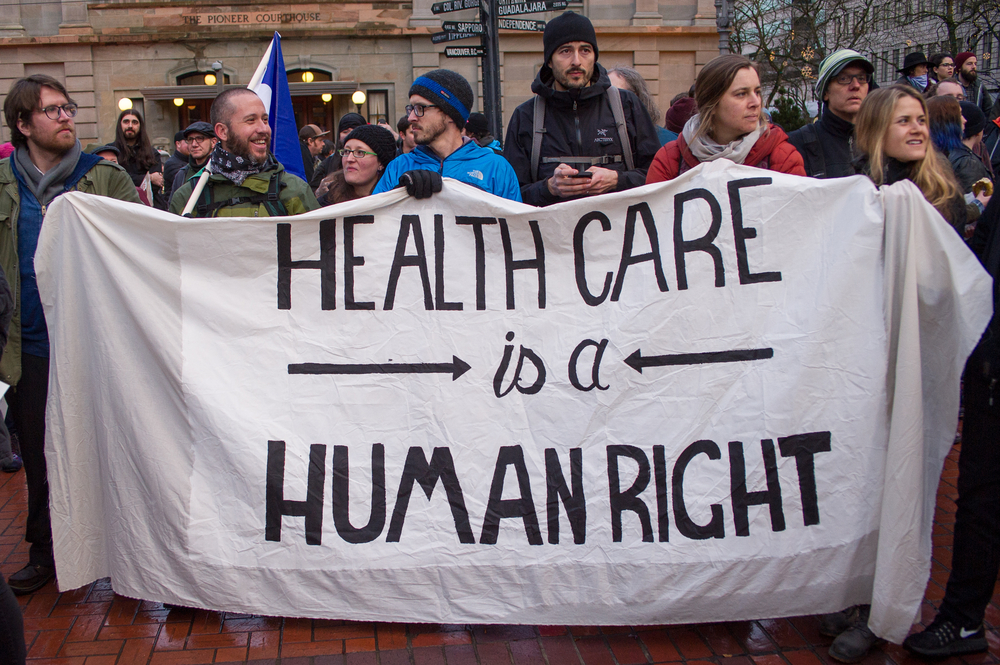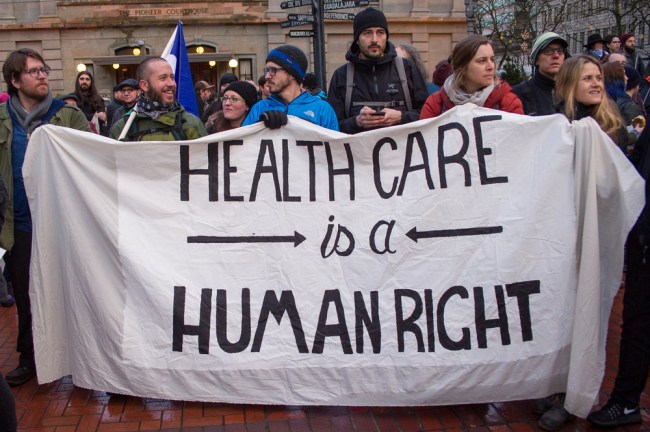Abortion Rights Activists Remind Google That It’s Hurting Vulnerable Women

Welcome to The Week in Reproductive Justice, a weekly recap of all news related to the hot-button issue of what lawmakers are allowing women to do with their bodies!
In a week that’s seen a decision from the Supreme Court on undocumented women’s access to abortion, and a slew of primary elections that saw key races between anti- and pro-choice candidates, there was quite a bit of news that fell through the cracks. From abortion rights activists calling out red hot lies of the anti-choice movement to a slew of anti-choice legislation being introduced in Rhode Island, here’s what you may have missed this week in the fight for reproductive rights.
Supreme Court decision seems to side with Trump on abortion for undocumented minors—but that’s not the complete story
On Monday, the Supreme Court issued a decision that vacated a lower court’s ruling calling on the Trump administration to cease in banning undocumented minors’ access to abortion. The decision itself isn’t meant to stop undocumented girls and women from having abortions, but it did ultimately side with the Trump administration, which sought to erase the federal judge’s decision from March.
But according to the deputy director of the ACLU Reproductive Freedom Project, the decision—while obviously not a home run for reproductive rights—is hardly a win for the Trump administration, either. Brigitte Amiri told Vice News, “This [Supreme Court] opinion really only vacates the emergency order for Jane Doe to get her abortion, and she already did. That doesn’t really affect anything in our case. It doesn’t take away some sort of precedent that we were relying on. And in any event, we have Roe v. Wade. The government can’t ban abortion.”
The Trump administration has spent the past year trying to hold hostage and deny abortion rights to unaccompanied undocumented minors, even going so far as to try and disrupt a medication abortion that was already underway. Lawyers for Attorney General Jeff Sessions have argued the reason undocumented minors from other countries lack the right to get an abortion in the U.S., save in cases of medical emergencies, is that they don’t have the same rights as citizens, and that permitting them to have abortions would “incentivize” more minors to cross the border.
What we’re seeing is the president’s blatant, dehumanizing rhetoric of immigrants put into practice by attacking their human rights on a personal, individual level. The Supreme Court’s ruling is hardly going to put an end to this administration’s quest to strip immigrant women of the most basic human rights—but it’s also not going to stop organizations like the ACLU, which has been largely successful in its advocacy in this area, from fighting back.
Abortion rights activists remind Google that it’s hurting vulnerable women
On Wednesday, abortion rights activists flew a plane carrying a banner that read, “Accessing Abortion Care? Google Lies,” around a building where a Google shareholder meeting was taking place. Ahead of an impending Supreme Court decision that will determine whether fake women’s health clinics have the right to lie to and mislead pregnant women seeking their options, abortion rights groups have also been critical of Google for enabling these “crisis pregnancy centers” to pose as real abortion/women’s health clinics found on Google.
Many websites purporting to be real health clinics—all while operating without any medical license whatsoever—are among the first search results women seeking abortion clinics or their pregnancy options will find. Subsequently, they’ll find plain lies and scientifically disproven claims on many of these websites, or will go to these fake women’s health clinics and face even more deception and emotional manipulation.
Choice isn’t choice unless it’s informed—and in an age where almost everything we know about anything comes from the internet, it’s time for Google to take responsibility for how its search engine is affecting women’s reproductive rights.
Now we know who’s behind all those fake clinics in Texas …
Speaking of fake women’s health clinics, a new report from this week found a few Texas billionaires are behind the proliferation of fake women’s health clinics throughout the state. In addition to contributing millions to the Texas Right to Life PAC, the Wilks family is also funneling enormous donations to fake women’s health clinics, which outnumber real abortion clinics in the state by a jarring 10–1 ratio.
There’s plenty to be said about a couple of rich men essentially deciding what resources will be available to Texan women with unwanted pregnancies, but what I’m really stuck on is how many born, living children and families could have benefited from the Wilks brothers’ charity—which, instead, is going to help fake clinics lie to and shame women.
Female candidates, reproductive rights advocates moved the blue wave forward
On Tuesday, primaries preceding November’s midterms took place in states including California, Iowa, Montana, New Jersey, and New Mexico, with one special election taking place in Missouri. And while there remains an uphill battle to flip crucial seats this November, Tuesday evening saw a number of important victories for reproductive rights and women’s representation.
In California, Katie Hill won the Democratic nomination for the 25th district of California. Hill, in addition to representing the LGBTQ community, is a vocal advocate for abortion, and is also open about having had an abortion herself. She will face off against Steve Knight, the GOP incumbent, who boasts a zero rating from NARAL Pro-Choice America for his anti-choice voting record and stances.
And in addition to Deb Haaland’s resounding primary victory, which poises her to become the first Native American congresswoman in U.S. history, Lauren Arthur, a pro-choice Democrat in Missouri flipped her district, which went for Trump in 2016, in a special election for state senator. Victories like this are crucial in a state that’s enacted some of the most dangerous, radical anti-choice laws in the country in recent years.
It’s important to remember that abortion rights, birth control access, affordable health care, and so many more key reproductive rights are always on the ballot. That’s because, for better or for worse, our reproductive rights are decided every day by the lawmakers we vote into office. The reason state legislatures across the country have managed to push all the radical and extreme anti-choice legislation we’ve seen in recent years, is that anti-choice politicians have been dominating state politics for years. Every vote is in some way tied to reproductive rights, and if you want to do your part this midterm season, find which candidates on your ballot are endorsed by Planned Parenthood, NARAL or EMILY’s List.
Abortion-related foreign aid restrictions are yielding disastrous consequences
As it turns out, President Trump’s decision to reinstate the global gag rule has produced extremely detrimental global health outcomes. (Shocking, I know.)
According to a report from this week, the global gag rule, which effectively defunds any global organization that even offers education about abortion to girls and women, is threatening the ability of groups to test and provide aid for HIV/AIDS. Many of the organizations that provide critical, life-saving information and resources about abortion also, coincidentally, educate and provide relief for a number of other key reproductive health conditions. Additionally, a group called CHANGE (the Center for Health and Gender Equity) estimates in the short years between 2017 and 2020, the reinstatement of the Mexico City policy will result in 6.5 million unwanted pregnancies, 2.1 million unsafe abortions, and 21,700 maternal deaths.
Of course, under this administration and due in part to the extremist, anti-choice politicians that it’s emboldening, reproductive rights are constantly under attack in the U.S., as well. But it’s no coincidence that a president who’s referred to majority non-white countries as “shitholes,” and referred to immigrants as “animals,” would casually subject people of color in developing countries around the world to the problems his global gag rule will create.
And this week, in threats to state-level abortion rights …
In a rare turn of events, no state made national headlines for passing frightening anti-choice legislation this week, but that doesn’t mean nothing happened.
Fake women’s health clinics have certainly come up a lot this week, and in Indiana, one will open across the street from a real abortion clinic. The move is no accident—in addition to using deceitful language online to masquerade as real women’s health clinics, “crisis pregnancy centers” also position themselves to look more trustworthy by setting up shop near real clinics. This also allows them to directly divert women from real health care services, and obtaining care and support from actual, licensed professionals.
And as we await a Supreme Court decision that will rule on this issue, it’s worth noting a Thursday report which found Louisiana has spent more than $1 million to defend its abortion restrictions against lawsuits since 2014. Once again: Imagine the born, living, non-hypothetical children and families who could have benefited from that.
This week wasn’t exactly a triumph for reproductive rights in Rhode Island, either, with anti-choice legislators working with Rhode Island Right to Life to introduce six radically anti-choice bills, which would attack minors’ abortion rights and late-term abortion access, in particular. According to the anti-choice Rhode Island Catholic, however, one bill would codify Roe v. Wade into the state’s constitution, taking a page from other states seeking to uphold a fundamental right and maintain the existing status quo around abortion rights, should the Trump administration be successful in its pledge to end the landmark ruling on abortion.
And yet, coming from proponents of a late-term abortion ban and prohibiting minors from crossing state lines for abortion care, Rhode Island Right to Life has called the pro-choice bill—which would literally change nothing—the “most extreme abortion bill.”
Sure, there’s never a dull week when it comes to reproductive rights, but boy did this week feel like a year.
Tune in next week to see what lawmakers will try next in their never-ending mission to derail reproductive justice!
(image: Shutterstock)
Want more stories like this? Become a subscriber and support the site!
—The Mary Sue has a strict comment policy that forbids, but is not limited to, personal insults toward anyone, hate speech, and trolling.—
Have a tip we should know? tips@themarysue.com
